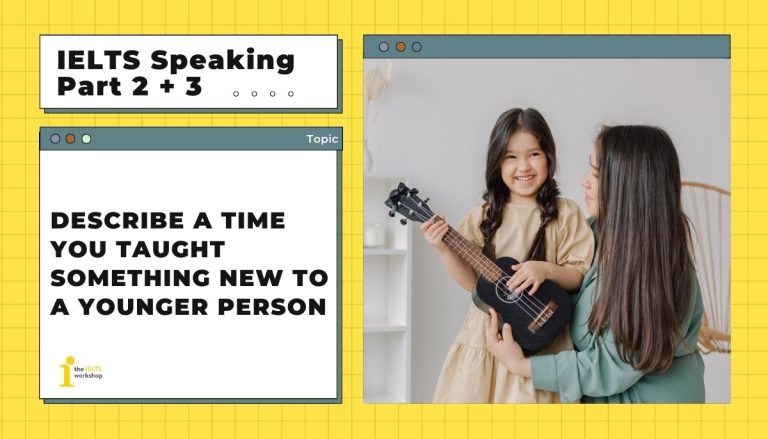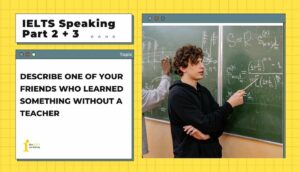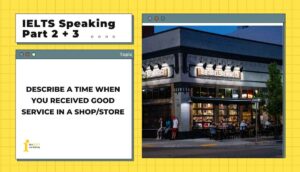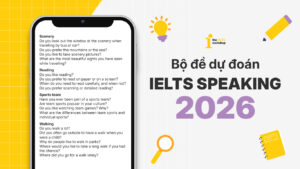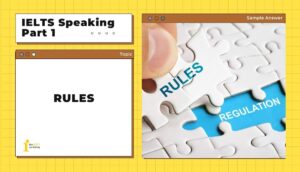Trong bài giải mẫu lần này, cô Gia Nghi của The IELTS Workshop sẽ hướng dẫn bạn trả lời topic “Describe a time you taught something new to a younger person“ trong IELTS Speaking Part 2. Cùng tham khảo sample, từ vựng và một vài cách diễn đạt ghi điểm trong phần thi IELTS Speaking nhé.
Part 2: Describe a time you taught something new to a younger person
Describe a time you taught something new to a younger person
You should say:
When it happened
What you taught
Who you taught
Why you taught this person
And how you felt about the teaching
Dưới đây là bài mẫu cho topic “Describe a time you taught something new to a younger person“.
1. Bài mẫu (Sample)
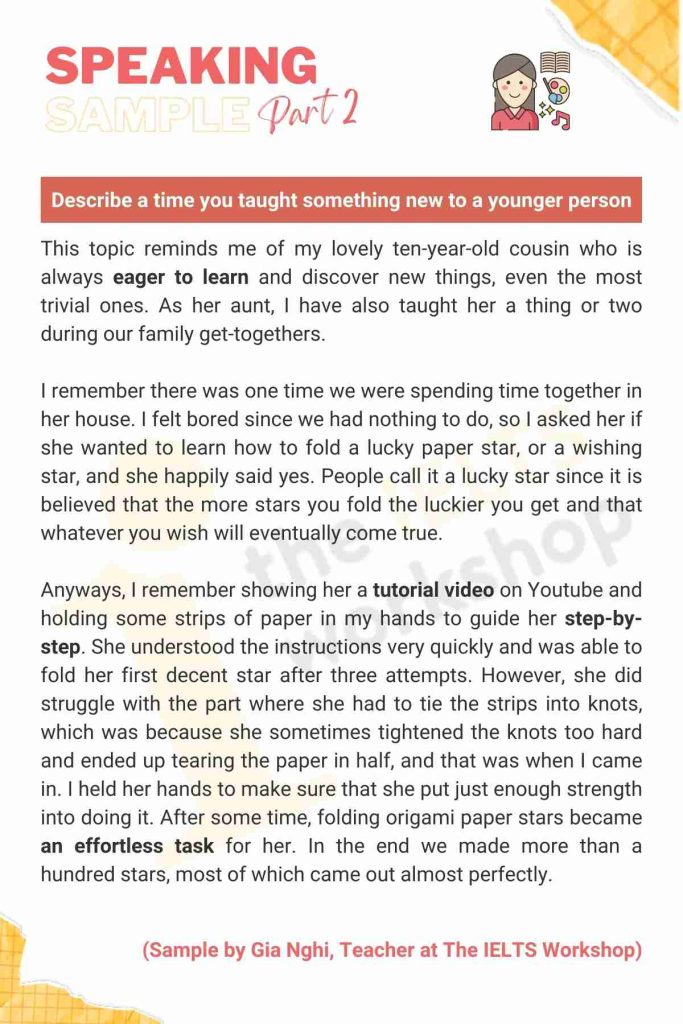
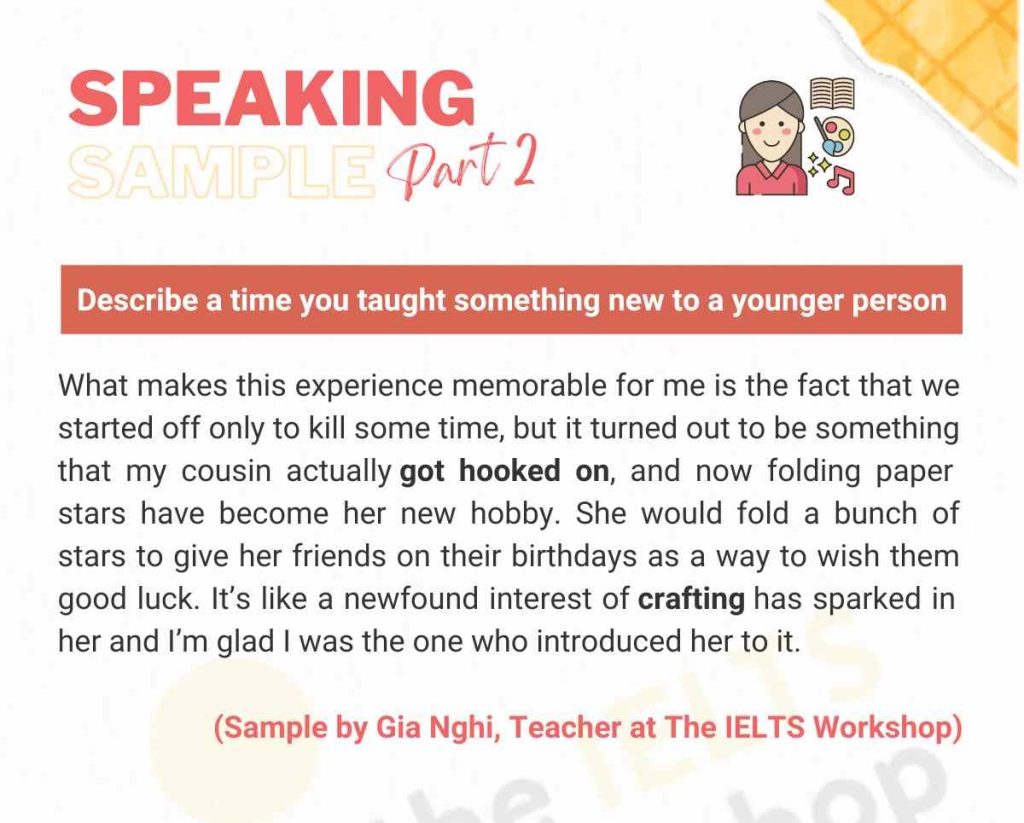
2. Từ vựng (Vocabulary)
- eager to learn (phr): ham học hỏi
- tutorial video (phr): video hướng dẫn
- step-by-step (collocation): từng bước một
- an effortless task (phr): một công việc dễ dàng
- get hooked on [something] (phr): trở nên hứng thú với [điều gì đó]
- Craft (v/n): làm thủ công
Part 3:
Bên cạnh Part 2, bạn hãy tham khảo thêm Part 3 cho chủ đề này nhé
- Do you still keep in touch with your friends from childhood? Why or why not?
- How important is childhood friendship to children?
- What do you think of communicating via social media?
- Do you think online communication through social media will replace face-to-face communication?
- What is the difference between having younger friends and older friends?
- Has technology changed people’s friendships? How?
1. What skills do adults need to have?
I believe as more responsibilities and expectations are put onto the shoulders of adults, there is a good reason for them to learn more skills, particularly practical ones such as teamwork, communication and active listening skills. This is because once they enter the workforce, it is necessary to build and maintain relationships among others. Enhancing those skills can help them demonstrate their adaptability, understanding and respect towards other people, resulting in higher chances of having more opportunities offered to them.
- expectation (n): kỳ vọng
- adaptability (n): khả năng thích nghi
2. How can people be motivated to learn new things?
For children, I think the easiest way to encourage them to make progress is by giving rewards, which can be as simple as praises from parents and teachers or small gifts whenever a kid remembers new words or a new fact. For adults, I would say it is important to set clear outcomes of the new skill or subject they want to pick up. Plus, those goals should be achievable, otherwise they would be too difficult to reach and demotivate them even more.
- praise (n): lời khen
- pick up (phr. verb): học (một thứ mới)
3. What can children learn from teachers and parents?
A lot of things actually. At school children study various subjects so their general knowledge is expanded every day. Teachers and parents also play an integral role in imparting essential morals such as respect, kindness and honesty. As the child grows up, parents can teach other important life skills like cooking, cleaning or managing money, which will eventually accompany them as mature individuals.
- moral (n): đạo đức
4. What are the skills that you wanted to learn?
Of course I wouldn’t consider myself a well-rounded person, because there are some skills that I’d like to learn, including cooking. To be honest, I have always depended on my mother and sister when it comes to making meals, so when I get some free time I’ll probably take a culinary course, hopefully upgrade myself to an amateur home cook someday.
- well-rounded (adj): toàn diện
- Amateur (adj/n): nghiệp dư
5. What skills should children learn before entering school?
I suppose all children should know basic self-care before the age of 5 or 6, because their parents will be nowhere near them when they’re going to school. Nowadays many parents and kindergarten teachers are already teaching small kids how to dress themselves and use the toilet properly, which I think is necessary and can also help with their independence.
6. How does a good learner learn something new?
Honestly, I wouldn’t define someone as a good or bad learner. I think it all comes down to having a suitable learning method of your own. Some people find learning with images useful for memorization, others like using music or just simply learning by heart. People who can identify what works best for them and adjust when needed may excel faster than those who are still struggling with finding their own best way of learning.
- memorization (n): quá trình ghi nhớ
- learn by heart (phr): học thuộc lòng
Bài mẫu bởi cô Gia Nghi – Giáo viên The IELTS Workshop
Các bạn có thể tham khảo các bài mẫu IELTS Speaking Part 2 của The IELTS Workshop cũng như tham gia bài test trình độ tiếng Anh và nhận tư vấn lộ trình miễn phí tại đây!


